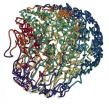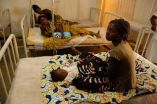(Press-News.org) Vienna, Austria: The use of permanent brachytherapy, a procedure where radioactive sources are placed inside the prostate, into or near to the tumour, preserves erectile function in approximately 50% of patients with prostate cancer, a researcher will tell the ESTRO 33 congress today (Saturday).
Brachytherapy works by giving a high dose of radiotherapy directly to the tumour, but only a very low dose to the surrounding normal tissues. Since erectile dysfunction (ED) can occur in up to 68% of patients who receive external beam radiotherapy for the condition, this is a significant improvement and the treatment should be offered to all patients, particularly those who are sexually active, the researchers say.
Dr Renée Oismüller, from the SMZ-Ost Donauspital, Vienna, Austria, analysed erectile function in 529 prostate cancer patients with an age range of 45 to 84 who had received a permanent brachytherapy implant between July 1999 and October 2013. The men completed validated questionnaires about their potency before the treatment, one month after treatment, and then every three months for the first two years, every six months up to five years, and once a year only after five years. The results showed that 46.3% of men had maintained potency two years after treatment, and at five years the rate was 51.4%.
"In our experience, brachytherapy used alone is as effective as other established therapies for localised low to intermediate risk prostate cancer. In addition to allowing the preservation of erectile function in half the men we studied, it has the advantage of involving a short hospitalisation of one to two days. The surgical removal of the entire prostate gland, usually involves an average of four to five days in hospital, so this is of benefit to both patients and healthcare systems," Dr Oismüller will say.
The treatment is employed and most effective in patients with localised prostate cancer, where the disease has not spread to outside the prostate gland. Outcomes such as recurrence-free survival are excellent, and side-effects are minor and limited in the majority of patients, the researchers say. "I believe that it is our duty to inform all patients about all the treatment options available and perhaps to emphasise the advantages of brachytherapy implants to those who are sexually active," says Dr Oismüller.
Provision of accurate information about the possibility of ED following radiation treatment to patients with prostate cancer is highly important, but healthcare professionals' skills in this are sometimes lacking, says the author of another study to be presented at the conference. Ms Carla O'Connell, a radiation therapist from Trinity College, Dublin, Republic of Ireland, surveyed Irish radiation therapists as to whether information about ED was given to patients in their departments, how this information was given, and how comfortable therapists were with addressing issues of sexuality with prostate patients.
"We found that a large proportion of therapists either did not address ED during discussions with patients about their disease, or only mentioned it if the patient raised the issue first. As far as we could ascertain, in many cases neither therapist nor patient felt comfortable enough to raise the topic. A lack of time, and the perception that patients do not expect radiation therapists to ask about sexual matters were the biggest barriers to addressing the problems of ED that we found," she will say.
The researchers call for further training in the different methods that can be used in discussing and assessing potential sexual side-effects of radiation treatment, and for the establishment of guidelines on who should be responsible for these discussions and at what stage in the treatment they should take place. The study shows that patients may not be being informed adequately about treatment-related side-effects that can have a profound long-term effect on their sexual health, they say.
"We found that responsibility for educating patients on these matters was being shared between radiation therapists, nurses, and radiation oncologists, often with no clear direction as to who should be doing what. It would be interesting to follow up this study with a survey that ascertained radiation oncologists' role in ED education; for example, whether they currently discuss the issue at an early stage in patient treatment. And I would also like to see whether training in discussing sexual issues with patients might help radiation therapists feel more confident in their ability to do so," Ms O'Connell will say.
President of ESTRO, Professor Vincenzo Valentini, a radiation oncologist at the Policlinico Universitario A. Gemelli, Rome, Italy, said: "Modern radiotherapy is increasingly able to provide less demanding treatments that preserve organ function. This study provides the radiotherapy community with a benchmark for erectile dysfunction, and I hope it will encourage more centres to include brachytherapy in their treatment options."
INFORMATION:
Abstract nos: 0073, Proffered papers, prostate session, at 10.30 hrs (CEST) on Saturday, 5 April, Schubert 4-6, and 0589, Proffered papers, Current perspectives on patient care and clinical practice session, at 16.30 hrs (CEST) on Monday 7 April, Schubert 1-3.
Brachytherapy helps maintain erectile function in prostate cancer patients without compromising treatment outcomes
2014-04-05
ELSE PRESS RELEASES FROM THIS DATE:
Loneliness impacts DNA repair
2014-04-05
In captivity, grey parrots are often kept in social isolation, which can have detrimental effects on their health and wellbeing. So far there have not been any studies on the effects of long term social isolation from conspecifics on cellular aging. Telomeres shorten with each cell division, and once a critical length is reached, cells are unable to divide further (a stage known as 'replicative senescence'). Although cellular senescence is a useful mechanism to eliminate worn-out cells, it appears to contribute to aging and mortality. Several studies suggest that telomere ...
Major genetic study links liver disease gene to bladder cancer
2014-04-04
A University of Colorado Cancer Center study published today in Journal of the National Cancer Institute (with related research being presented this weekend at the American Association for Cancer Research Annual Conference 2014) details the discovery of a new genetic driver of bladder cancer: silencing of the gene AGL.
"We tend to think of cancer resulting from mutations that let genes make things they shouldn't or turn on when they should be quiet. But cancer can also result from loss of gene function. Some genes suppress cancer. When you turn off these suppressors, ...
Scientists generate 3D structure for the malaria parasite genome
2014-04-04
RIVERSIDE, Calif. — A research team led by a cell biologist at the University of California, Riverside has generated a 3D model of the human malaria parasite genome at three different stages in the parasite's life cycle — the first time such 3D architecture has been generated during the progression of the life cycle of a parasite.
The parasite that causes malaria in humans is Plasmodium falciparum. The female Anopheles mosquito transmits P. falciparum from an infected human to healthy individuals, spreading malaria in the process. According to the World Health Organization, ...
Analysis finds less research attention given to diseases of the poor
2014-04-04
Death is not distributed equally around the world. In high-income countries, people typically die in old age of chronic diseases such as cancer or cardiovascular problems. In low-income countries, death comes primarily from infectious and perinatal diseases, and strikes at a young age.
But despite massive international efforts to improve global health, a new analysis of nearly 4 million scientific articles finds that research is disproportionately focused on diseases that primarily afflict wealthy countries. Correspondingly, less research attention is given to diseases ...
Nowhere to hide: Kids, once protected, now influenced by tobacco marketing
2014-04-04
(Lebanon, NH, 04/04/14) — More than 15 years ago, many states and tobacco manufacturers established restrictions to prevent youth exposure to the marketing of nicotine products. This follows regulations imposed 50 years ago that banned cigarette ads from TV. Despite these continued efforts, a new study by Dartmouth researchers reveals that not only are young people exposed to tobacco marketing, they are influenced by it. According to a study published in the Journal of Adolescent Health, exposure to "direct marketing" is associated with increased use of tobacco.
"For ...
Does a junk food diet make you lazy? UCLA psychology study offers answer
2014-04-04
A new UCLA psychology study provides evidence that being overweight makes people tired and sedentary — not the other way around.
Life scientists led by UCLA's Aaron Blaisdell placed 32 female rats on one of two diets for six months. The first, a standard rat's diet, consisted of relatively unprocessed foods like ground corn and fish meal. The ingredients in the second were highly processed, of lower quality and included substantially more sugar — a proxy for a junk food diet.
After just three months, the researchers observed a significant difference in the amount ...
Higher social class linked to fewer bone fractures among non-white women
2014-04-04
If you are a middle-aged African-American or Asian woman, your social class may play a significant role in how likely you are to suffer bone fractures, a UCLA-led study suggests.
The study, published in the current issue of Osteoporosis International, is unique in that it followed Asian, African-American and white women for a period of nine years during mid-life; most previous studies on socioeconomic status and osteoporosis risk had focused solely on older white women and often had not collected information on fractures over time.
The new findings help shed ...
EAGeR medical trial: Low-dose aspirin won't prevent pregnancy loss
2014-04-04
BUFFALO, N.Y. – The Effects of Aspirin in Gestation and Reproduction (EAGeR) medical trial has found that, in general, low-dose aspirin is not beneficial for future pregnancy outcomes in women with prior pregnancy loss.
However, in women with one pregnancy loss within the previous 12 months, there did appear to be a benefit.
Jean Wactawski-Wende, PhD, professor in the Department of Epidemiology and Environmental Health in the School of Public Health and Health Professions at the University at Buffalo, is a principal investigator of the Buffalo EAGeR trial and co-author ...
In mice, obese dads produce heavier daughters with epigenetically altered breast tissue
2014-04-04
SAN DIEGO — Obese male mice and normal weight female mice produce female pups that are overweight at birth and in childhood, and have increased number of "terminal end buds" in their breast tissue — the site where cancer often develops in rodents.
The findings, presented by a Georgetown Lombardi Comprehensive Cancer Center researcher at the AACR Annual Meeting 2014, come from one of the first animal studies to examine the impact of paternal obesity on future generations' cancer risk.
In addition, the researchers say they've found evidence that obesity could change the ...
Bacterial gut biome may guide colon cancer progression
2014-04-04
PHILADELPHIA—(April 4, 2014)— Colorectal cancer develops in what is probably the most complex environment in the human body, a place where human cells cohabitate with a colony of approximately 10 trillion bacteria, most of which are unknown. At the 2014 American Association for Cancer Research Annual Meeting in San Diego, researchers from The Wistar Institute will present findings that suggest the colon "microbiome" of gut bacteria can change the tumor microenvironment in a way that promotes the growth and spread of tumors.
Their results suggest that bacterial virulence ...



